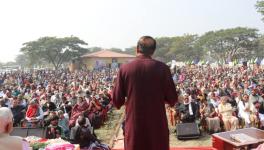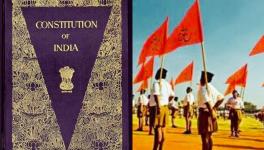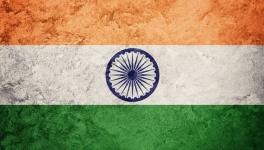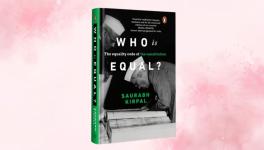Secular-Socialist & Nehru-Mujib: Identical Stance by Rulers in Dhaka and Delhi
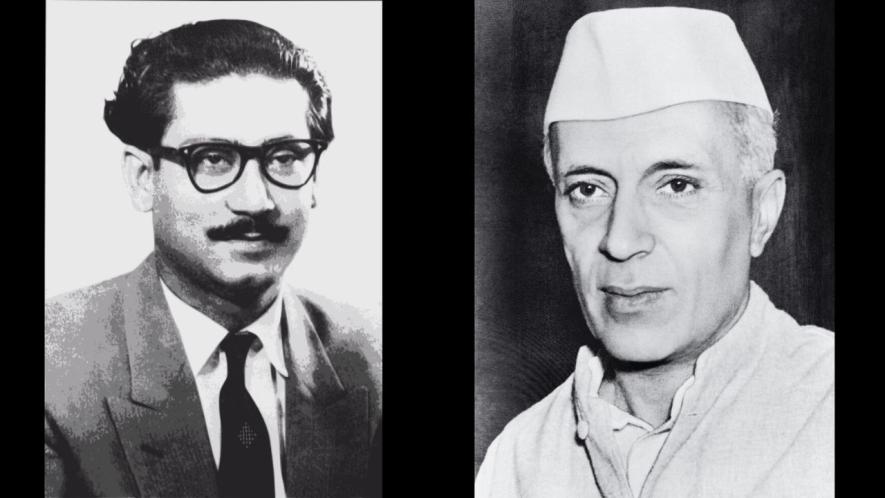
On November 25, the Supreme Court dismissed a batch of petitions challenging the inclusion of the words ‘socialist’ and ‘secular’ in the preamble to the Constitution of India. These petitions were filed in 2020 i.e., after 44 years of addition of these words in the Constitution.
The petitioners challenged the authority of the government to amend the Preamble to the Constitution. Among the petitioners, the two prominent ones are Subramanian Swamy and advocate Ashwini Upadhyay of the ruling Bharatiya Janata Party (BJP).
On the other side of the country’s border, after dethroning Sheikh Hasina, a campaign is now on in Bangladesh to rectify the mistakes committed at the onset of the nation’s independence. These campaigners are no different from the ones who broke the idol of Sheikh Mujib or the mob who rampaged his house in Dhanmondi and set it afire.
Rather, the rulers in the interim government in Bangladesh and their cohorts have even thrown away the picture of the ‘Father of the Nation’, Sheikh Mujibur Rahman from Rashtrapati Bhavan. His writings are being excised from the school curriculum.
The interim government wants to abrogate the 15th amendment (that restored secularism as a fundamental principle of the state, among other things) from the Constitution of Bangladesh. The Attorney General of the country, in a petition in this regard, has argued in favour of removing the two words ‘secularism’ and ‘socialism’ from the Constitution. The Bangladesh court has reserved its verdict.
In 2011, through the same amendment, Sheikh Mujib was declared as the ‘Father of the Nation’ by the government led by his daughter, Sheikh Hasina. However, the interim government does not recognise Mujib as the ‘Father of the Nation’ and wants the abrogation of the 15th amendment.
The Mohd Yunus-advised interim government has also constituted a commission to consider the matter of total abrogation or amendment of the Constitution.
This stance of the Yunus government is likely to impact politics across the border. There is no doubt that the relationship between India and Bangladesh rose to a great height during Sheikh Hasina’s reign, with both sides benefiting from the cooperation. But, after Hasina left the country, the relations between the two neighbours have changed overnight. Either side has started thinking of the other as an ‘enemy’ country, though neither has said so in public.
Yunus, the chief adviser to the interim government, has said, “The relations between India and Bangladesh are now at the lowest ebb”. A few days ago, his legal advisor, Asif Nazrul, said, “As of now, Bangladesh has no friendly neighbour”. It hardly needs mention that he has clearly hinted at India, indicating that they no longer consider the ‘big neighbour’ as a friendly nation.
On the other hand, India, while making repetitive reactions on incidents of repression of the minorities in Bangladesh, especially Hindus, has indicated its displeasure on the steps taken by the new guardians of the neighbouring country. India’s Prime Minister has himself raised the issue of “repression” of minorities in his maiden call to wish Yunus on his assuming office, ignoring diplomatic courtesy.
What is amazing, of course, is the fact that despite the differing opinions of the two governments, the political ideologies of the respective establishments at present in Bangladesh and India have converged on one point. The two words -- Secularism and Socialism -- are anathema to the ears of the ruling dispensation in India, too. Both these words were introduced in the Constitution by Prime Minister Indira Gandhi in 1976 by getting the 42nd amendment passed.
The BJP’s objection to the inclusion of these two words in the Constitution at the instance of Indira Gandhi does not mean that the ruling party finds no fault with the original Constitution framed during the period of the first Prime Minister Jawaharlal Nehru. Rather, BJP is against all that Nehru stood for.
The way the crusade is building up in Bangladesh against ‘Mujibbad’ or Mujib's thoughts, is similar to the way the present rulers in India talk about Nehru, the first Prime Minister of Independent India. Prime Minister Narendra Modi seems to derive some additional energy if given an opportunity to launch a tirade against Nehru. His government has changed the identity of many institutions originally named after Nehru. Yunus’s followers are doing the same against Mujibur Rahman in Bangladesh, which is not surprising at all.
Even during the liberation war, there were two distinct and opposite political ideologies in erstwhile East Pakistan, now Bangladesh. One faction was openly in favour of remaining a part of Pakistan and considered the liberation war as a separatist movement backed by India. The other faction was pro-liberation, who fought the war leading to the birth of Bangladesh.
However, the fact that the radical Islamists and pro-Pakistani forces lost the war does not mean that they were eradicated from Bangladesh. Before the liberation war, the first general election in the-then unified Pakistan held in 1970, conducted during the military regime of General Yahya Khan, had brought significant changes in the political and territorial landscape of that country.
In the eastern part, the election was a referendum on the issue of regional autonomy, the denial of which by Western rulers forced the Bengalis to plunge into the struggle for independence. Mujib’s party, the Awami League, got a majority in the national assembly by capturing 160 out of 162 seats in East Pakistan. But Mujib was not allowed to become the Prime Minister of Pakistan. Instead, he later became the leader of an independent country, Bangladesh.
However, this is one aspect of that election result. The Awami League secured 98% of the seats in the Bengali-speaking eastern part, and got the support of 74.9% of voters. Thus, it was clear from the result that that 25% of the electorate did not want an independent country. They wanted to remain a part of Pakistan, clinging to Islam.
During the Bangladesh liberation war, the presence of those who wanted to remain in Pakistan was felt on the battlefield as collaborationist paramilitary forces, who fought against the Mukti Bahini (liberation army) to assist the Pakistan Army under the name of different organisations, such as Razakar, Al Badr, Al Shams.
The Jamaat-E-Islami, Pakistan, the predecessor of Jamaal-E-Islami Bangladesh was a strong force then which opposed the vivisection of Pakistan and the birth of Bangladesh. The Jamaat, like other religious fundamentalist forces, is a powerful social force despite not having much success in the electoral battle. Like Hindu fundamentalist forces in India, Jamaat in Bangladesh also has penetration in the general administration and security forces.
As a result of the global resurgence of Islam, there has been a rise of extremist Islamic forces in Bangladesh as well. After the assassination of Sheikh Mujibur Rahman in 1975, they quickly began to advance, especially after General Ziaur Rahman lifted the ban on Jamaat and opened the door to religion-based politics.
Today, it is not only Jamaat, but multiple ultra-Islamic forces, such as, Hizb-ut-Tahrir (party of liberation), Hefazat-e-Islam (protector of Islam) that are active in Bangladesh, with influence across various political entities. These pan-Islamist fundamentalist political organisations aspire to re-establish the Islamic Caliphate and implement Sharia, like in Afghanistan, Syria or Iran.
Read Also: Bangladesh: How The 'Economic Miracle’ Crumbled
Although the Awami League (AL) and Bangladesh National Party (BNP) are officially secular in nature, both Khaleda Zia of BNP and Sheikh Hasina of AL have compromised with these extremist Islamic forces to stay in power. After Hasina’s government, which ruled the country in the past 15 years was ousted in a popular uprising on August 5 this year, these Islamic fundamentalist forces have started to flex muscles and are trying to re-establish Islam politically as early as possible by an unelected government. These forces participated in the popular uprising, driven by the student movement, in their own way.
In fact, these fundamentalist organisations played a significant role in the involvement of a large section of the common people in the movement to remove Hasina from power.
Unfortunately, the Joe Biden administration in the US, who trusts Yunus the most, views Jamaat as a social force. Within a short time after the interim government took charge, Yunus, a close ally of the present US administration, not only lifted the ban on Jamaat but also began implementing their agenda.
Like the Hindutva supporters in India, Jamaat and like-minded parties and forces in Bangladesh advocate the removal of the term ‘secular’ and ‘socialist’ from the Constitution. They do not believe in either Sheikh Mujib's contributions or his existence.
After the two late generals and former presidents, Ziaur Rahman and Hussain Muhammad Ershad, the chief advisor of interim government, Yunus, who is neither a military ruler, nor a politician, but a Nobel laureate in peace, is promoting State-sponsored Islam, what once one of his predecessors did by replacing the ethos of Bengali nationalism by Bangladeshi nationalism.
India, being the Hindu majority neighbour and majoritarian politics practiced by the ruling Hindutva forces, is making the path easy in Bangladesh for a change in the political landscape again in 2024, after 1971 and 1975. In this context, one must view the fact that, for the first time since the independence of Bangladesh, a Pakistani ship from Karachi has directly reached Chattogram (Chittagong) port, or the death anniversary of Muhammad Ali Jinnah was observed with dignity in Dhaka, and the Pakistani government has decided to grant free on-arrival visas to Bangladeshis, and Bangladesh Radio is reintroducing Urdu programmes.
At this juncture, the BJP has hit a goldmine in the eastern sector in the present Bangladesh, like another Pakistan. Unless something unimaginable happens, it is next to impossible for the Awami League to return to power soon through elections in Bangladesh. It is likely that the forces driven by Islamic fundamentalist ideology will capture power.
The rise of Islamic fundamentalism in Bangladesh is harmful for India, but for Hindutva forces it may prove beneficial. They may not feel uneasy with the identical ideology of the inimical force.
Regardless of ideology, the affinity among fundamentalist forces is universal. They play complementary roles. The settlement of the Ram temple dispute and abrogation of Article 370 in Jammu & Kashmir have left the BJP facing a crisis of issues. The Lok Sabha results this year have made it apparent to them that there is no alternative other than pursuing the Hindutva way fiercely.
On the one hand, by practicing neo-liberal economic policies, BJP is handing over the economy’s reins in the hands of a few industrialists. On the other hand, they are getting into religious and ethnic divisions in the social sphere. Manipur-Sambhal-Adani are part of a unified strategy. After Ayodhya (Babri Masjid demolition), Varanasi (Gyanvapi mosque dispute), and Mathura (Shahi Idgah), Hindutva forces have now launched an expedition across the country to search for temples beneath mosques. This includes Ajmer Sharif in Rajasthan, which is one of the major pilgrimage sites for Muslims and non-Muslims.
In the Constitution of Bangladesh, made first time in 1972 during the period of Mujibur Rahaman, the word ‘secularism’ was incorporated, which was originally part of the declaration of independent government established during the liberation war of 1971. But the same was dropped during the rule of General Ershad.
In the Constitution of India framed first, the word ‘secularism’ was not mentioned, but it was fully wrapped in the very concept of the Constitution.
Fundamental changes were brought in the Bangladesh Constitution by the two military rulers. First, Ziaur Rahman added in the Constitution, through the 5th amendment, the phrase ‘Bismillah-ur Rahman-ur Raheem’ meaning thereby ‘in the name of Allah, the supreme and infinite merciful lord’. Later, the court struck down the other parts of the amendment, upholding only the inclusion of ‘Bismillah...’.
Another military ruler, General Ershad, brought an amendment to declare Islam as the State religion and simultaneously excised the word ‘secularism’. Although Sheikh Hasina brought back the word ‘secularism’, Islam is still the State religion in terms of the Constitution. However, it is mentioned that all religious faiths would be accorded equal opportunity.
In India, BJP has never officially opposed the concept of secularism. In fact, in the application form for membership of the party, one must declare unequivocal faith to the ideals of secularism. Because it is compulsory to mention the said declaration for getting recognition from the Election Commission.
However, in the matter of State religion, there is no distinction in the stands of BJP and their overlords and the forces backing Yunus. The Attorney General of Bangladesh recently argued in court that the word ‘secularism’ was immaterial in the declaration of the character of the State when 90% of the population of the country were followers of Islam.
In this country, the Hindutva lobbyists propound the same theory and, as a result, their opponents make allegations against them of trying to make a ‘Hindu Pakistan’. In future, the phrase ‘Hindu Bangladesh’ might also be added.
Read Also: Jharkhand: ‘Infiltration’ is BJP's Weapon; Next Bihar and Bengal?
Besides, the vituperative way Modi has spread hatred against Muslims in his election campaign has made apparent his unequivocal dislike for ‘secularism’. He has bypassed the ideals of secularism in the foundation laying as well as inauguration ceremonies of both the new Parliament House and Ram Mandir.
Till now, the instances of torture and persecutions of minorities, especially Hindus in Pakistan, have remained the only weapon in BJP’s hand to arouse Hindutva in India. Bangladesh has now become an allied force in making Hindutva a more powerful weapon.
Earlier, illegal migration was the only weapon in BJP’s hands against Bangladesh. But, the coming back of Modi's friend Donald Trump to power in the US might help in the resurgence of Hindutva in the outside world.
However, there is scope for raising question marks on the sincerity of BJP and its government regarding their stance besides the repression of Hindus in Pakistan and Bangladesh. The stringency in allowing visas to Bangladeshi nationals after August 5 has actually put the minorities in that country into great difficulties.
The BJP has, though in a disputed and unethical manner, passed the Citizenship Amendment Act in an effort to polarise Hindu votes by promising Indian citizenship to the Hindus, Sikhs, Buddhists, Jains and Christians being persecuted in the neighbouring countries. But, five years have elapsed since the enactment, there is hardly any case of allowing citizenship to the persecuted minorities of those countries.
BJP's unethical vote bank politics, therefore, has thrown their core political commitment into serious questions.
The writer is Executive Editor, The Wall, and former Senior Editor, Times of India. The views are personal.
Get the latest reports & analysis with people's perspective on Protests, movements & deep analytical videos, discussions of the current affairs in your Telegram app. Subscribe to NewsClick's Telegram channel & get Real-Time updates on stories, as they get published on our website.









